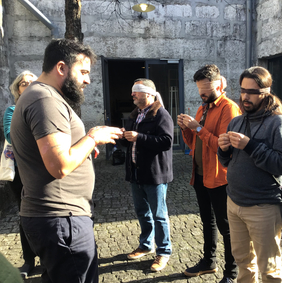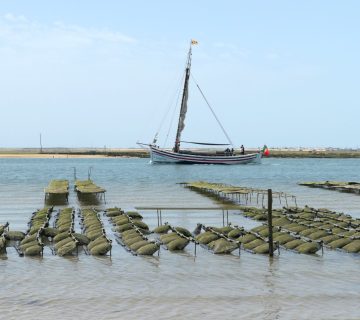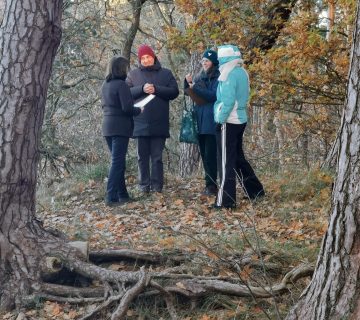Exploring other senses (Image: Silva)
Guimarães, the birthplace of Portugal and a UNESCO World Heritage Site, welcomed the first IE Certified Interpretive Guide (CIG) course in Portugal from 21-25 January. Financial support for this course came from the Interreg project CHRISTA, which aims to protect and preserve natural and cultural heritage assets and deploy them for the development and promotion of innovative, sustainable and responsible tourism strategies.
The presence of heritage all over the city, the museums and centres in the city provided a special basis for this course. On the other hand, the efforts of Valya Stergioti (IE Training Coordinator) and Carla Silva (IE Country Coordinator Portugal) to manage an extensive but balanced training programme, made a full week of learning about interpretation seem easy. So, the small group of ten participants from different parts of the country, and also with various backgrounds, maintained their motivation to learn and to share about interpretation experiences.
All participants were surprised with the excellence of the course in both content and methodology, and were very motivated to raise this subject in their professional activities and to spread the heritage interpretation concepts and methodologies with other professionals.
Although the results of this course had enough of a personal significance for each participant, the blend of particular features also had a surprising result: This group decided to go further and to develop within IE a plan of activities to promote and disseminate heritage interpretation in the country.
At this time, Carla Silva (IE Country Coordinator Portugal) already has a solid plan of activities for 2020 that includes communication, information gathering, translation of documents, and also meetings with key people; tasks that most participants in this course will collaborate on.
It is time to recover from recent years with a scarcity of interpretation activities, often disconnected, and to start a sustainable plan to get professionals together and disseminate interpretation in several fields across the country.
In the meantime, this new group is also aware of the importance of a formal national association for Portugal and we can consider two possibilities: the first is the revival of the INTERPRETARE association (see below); and the second is to create a new national association of heritage interpretation. So, you can count that some news about this development will appear in the future.
The association INTERPRETARE was founded in 2008 and in its first years carried out some initiatives, such as the organisation of training courses, it collaborated in local projects and in 2013 participated in the setting up of an interpretation centre, School of Water (http://www.escoladaagua.pt/) . However, during the last years it has been quite inactive.
It is widely believed that Portugal’s first King, Afonso Henriques, was born in Guimarães, so the city is called ‘the cradle city’. From last January we can also attribute another ‘cradle’ to this city related to a new impulse of heritage interpretation in Portugal. Thank you, IE, for this opportunity and we hope to give back by helping IE to be better known in Portugal and heritage interpretation to be employed more widely.
Pedro Morais is an ecotourism consultant and trainer with a special interest in the incorporation of education within tourism activities. He is the founder of INTERPRETARE and a former ecotourism lecturer. He can be contacted at: geral@pedromorais.eu.
To cite this article:
Morais, Pedro (2020) ‘A new cradle for heritage interpretation in Portugal‘. In Interpret Europe Newsletter 1-2020, 9.
Available online:
www.interpret-europe.net/fileadmin/Documents/publications/Newsletters/ie-newsletter_2020-1_spring.pdf




